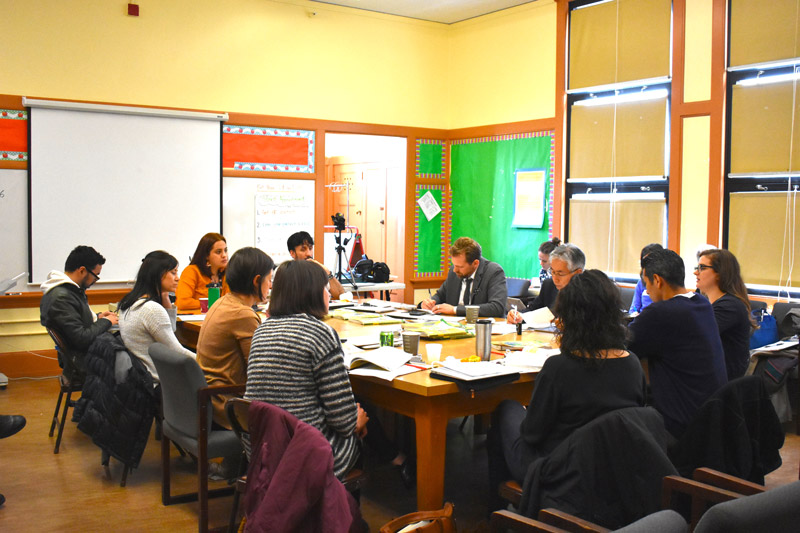Overview
Lesson Study teams can manage their own team meetings once they are familiar with the process. But school-wide Lesson Study requires some additional ongoing management, to ensure that knowledge builds across the school, as teams learn from each other and contribute to the school’s long-term vision.
Key Tasks in Managing School-wide Lesson Study
For school-wide Lesson Study to thrive, someone—or some group of people—must take responsibility for managing several different kinds of tasks. Some of these are “routine” management tasks that every administrator is familiar with, such as managing logistics. Some may be less obvious, such as strategizing and supporting knowledge flow. Here we outline the major elements that need to be managed in school-wide Lesson Study.
Logistics
- Scheduling Lesson Study team meetings, research lessons and substitutes
- Providing tools to support high-quality Lesson Study team meetings and research lessons (e.g., agendas, protocols and facilitation as needed)
Organizational Support
- Building support among stakeholders (e.g., parents, administrators)
- Anticipating and monitoring challenges (within teams or the organization)
- Protecting time for the work
Knowledge Flow Across Teams
- Strategically planning for knowledge flow across settings (whole-faculty professional learning, teams, individual classrooms), through design of these experiences, shareable documentation of learning, and common tools (e.g., observation frameworks) that help knowledge travel
- Taking stock of the knowledge and resources emerging from each team and building school-wide consideration of key knowledge that emerges
Knowledge Flow Into and Out of the School
- Identifying and arranging knowledge resources (research, video, presentations, etc.) to help realize the school’s vision
- Identifying a knowledgeable outsider(s) who can observe and provide feedback on the research lessons, inform the school’s theory of action, and suggest useful resources
Who Should Manage These Tasks?
Schools in Japan typically have a Steering Committee to support School-wide Lesson Study, often consisting of representatives of each lesson study team (or grade band) and one or more instructional leaders. The Steering Committee handles the logistical and strategic planning listed in the previous section.
Some U.S. schools have also formed Steering Committees (either a new committee or an added function to an existing committee). In Japan, helping to build and lead successful School-wide Lesson Study is an important bona fide for consideration for the principalship.
While the site leader always has an important behind-the-scenes leadership role in school-wide Lesson Study, other educators can take responsibility for much of the ongoing management of school-wide Lesson Study. Successful approaches we have seen include management by:
- One or more classroom teachers (who may rotate out after a several-year term, and who may receive release time)
- An instructional coach (from within or outside the school) whose time is partially dedicated to supporting school-wide Lesson Study
- An administrator (often an assistant principal) whose time is partially dedicated to supporting school-wide Lesson Study
- Lesson study should still be teacher-driven, even when a designated manager or leadership team oversees various facets of the school-wide Lesson Study work. Managers of the work likely will benefit by seeing themselves as builders of enthusiasm and capacity, rather than enforcers of professional development.
- The designated manager does not need to facilitate all Lesson Study activities–rather, they should see their role as nurturing broad leadership. Lesson study teams benefit from distributing and rotating roles (facilitator, note-taker, etc.) among team members, to build commitment and leadership skills among all participants. Likewise, schools will benefit from distributing and rotating many aspects of school-wide Lesson Study management in the future, even if it is not immediately feasible at the outset
Strategies to Support Knowledge Spread Across a School
School-wide Lesson Study is most effective when when school-wide professional learning and team learning build on each other, and when both of them flow into daily practice. Consider how your school’s steering committee can plan for knowledge flow. Some strategies to consider:
- Free up as many teachers as possible to attend the research lessons of other teams and participate in the post-lesson discussions. A framework or question shared across all teams can further strengthen this learning.
- Ask teams present their learnings at a school-wide staff meeting. Short segments of lesson videos and student work, focused on the school’s shared theory of action, can help knowledge travel across groups.
- Designate some teachers, coaches, or other educators to summarize and share what teams are learning, perhaps in the form of a newsletter (examples below).
- Identify tools that can facilitate sharing across the school–for example, observation rubrics, frameworks to support new teaching strategies, reflection questions.
- Schedule and lead meetings to develop the research theme and to elicit teachers’ ideas about how to achieve the research them.
- Help find resources and strategies to advance the school’s vision of student learning–including readings, video, and presentations or demonstration lessons by knowledgeable outsiders
- Develop and coordinate a plan that allows teams to learn from one another and to share their knowledge with the outside–for example, scheduling research lessons so that other teams can attend, seeing that tools developed or refined by groups are shared with other groups, etc.
- Surface problems that develop as teachers seek to enact strategies at different grade levels, and share the knowledge developed at one grade level that may be useful at others.
